Key takeaways:
- Understanding the dosage and time it takes for cannabis edibles to kick in is crucial for a positive experience.
- Legal compliance includes accurate labeling, age verification, and strict adherence to regulations to ensure consumer safety.
- Maintaining comprehensive records and ongoing employee training fosters a culture of accountability and enhances compliance.
- Transparency with both team members and customers can improve compliance practices and build trust within the community.

Understanding cannabis edibles
Cannabis edibles come in various forms, from gummies to chocolates, providing a delicious and discreet way to consume cannabis. I remember the first time I tried a cannabis-infused brownie; it felt like a delightful adventure as I savored the rich chocolate while knowing it was much more than just a treat. Isn’t it fascinating how something that starts as a simple recipe can transform into an experience that alters your perception and mood?
One of the critical aspects of understanding cannabis edibles is dosage. For instance, I learned the hard way that not all edibles are created equal; a small bite of a potent gummy can lead to an unexpectedly intense experience. Have you ever experienced that moment where you regret not checking the potency before indulging? Knowing the THC (tetrahydrocannabinol) content is essential, as it helps prevent those overwhelming highs that can sometimes turn a fun evening into an anxious night.
Another point to consider is the time it takes for edibles to kick in. Unlike smoking, which provides nearly instant effects, edibles can take anywhere from 30 minutes to two hours to start working. I’ve certainly felt that anxious anticipation waiting for the effects to wash over me, only to realize that patience is key. This delay is often a point of confusion for many new users—could it be that understanding this timing is crucial for a more enjoyable experience?
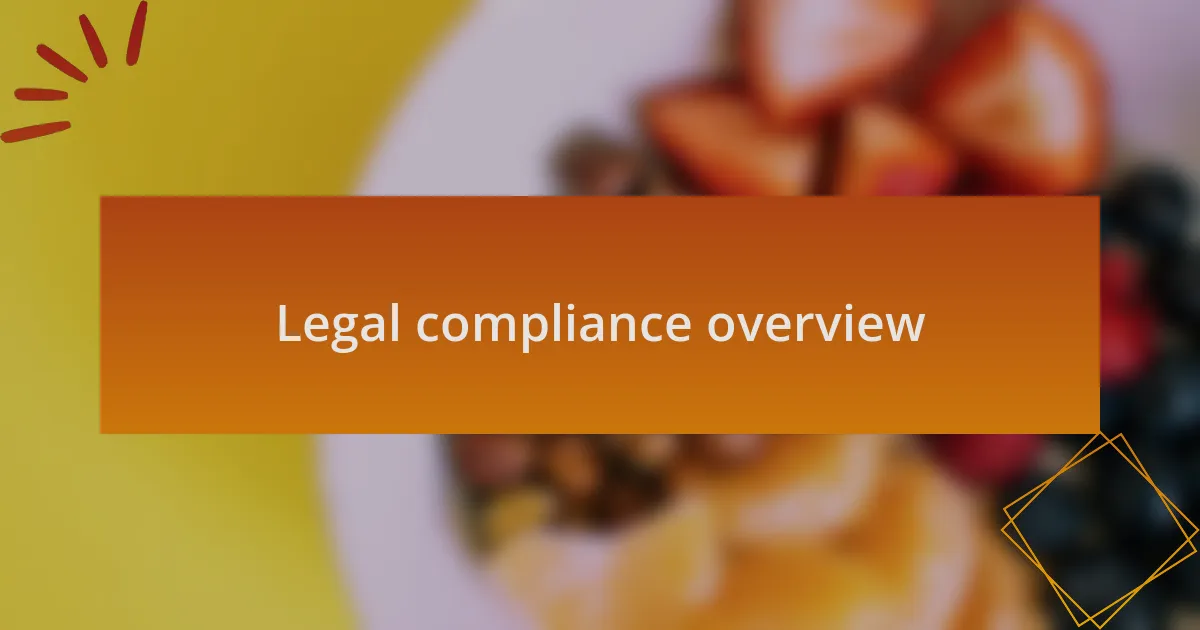
Legal compliance overview
Legal compliance in the realm of cannabis edibles can feel like navigating a maze. Each state or region has its own set of regulations that dictate everything from production to packaging. I once found myself deep in research, trying to comprehend the labels on a batch of edibles I intended to sell. It was eye-opening to learn how crucial accurate labeling is—not just for legality, but also for consumer safety. How could I ensure my products met the stringent requirements without sacrificing quality?
It’s also essential to be aware of the age restrictions surrounding cannabis edibles, as laws often vary significantly. I remember attending an event where I suddenly realized that some attendees couldn’t partake because they weren’t of legal age. This highlighted for me how vital it is to implement strict age verification processes to protect our community and comply with regulations. Shouldn’t we all do our part to keep cannabis consumption safe and responsible?
The importance of THC content reporting cannot be overstated in the legal landscape of cannabis edibles. I was surprised at how transparent some brands were about their lab testing results, providing peace of mind to customers. This not only fosters trust but also aligns with legal requirements to inform consumers about what they’re eating. Isn’t it reassuring to know that the edible you’ve chosen has been rigorously tested for safety and potency?
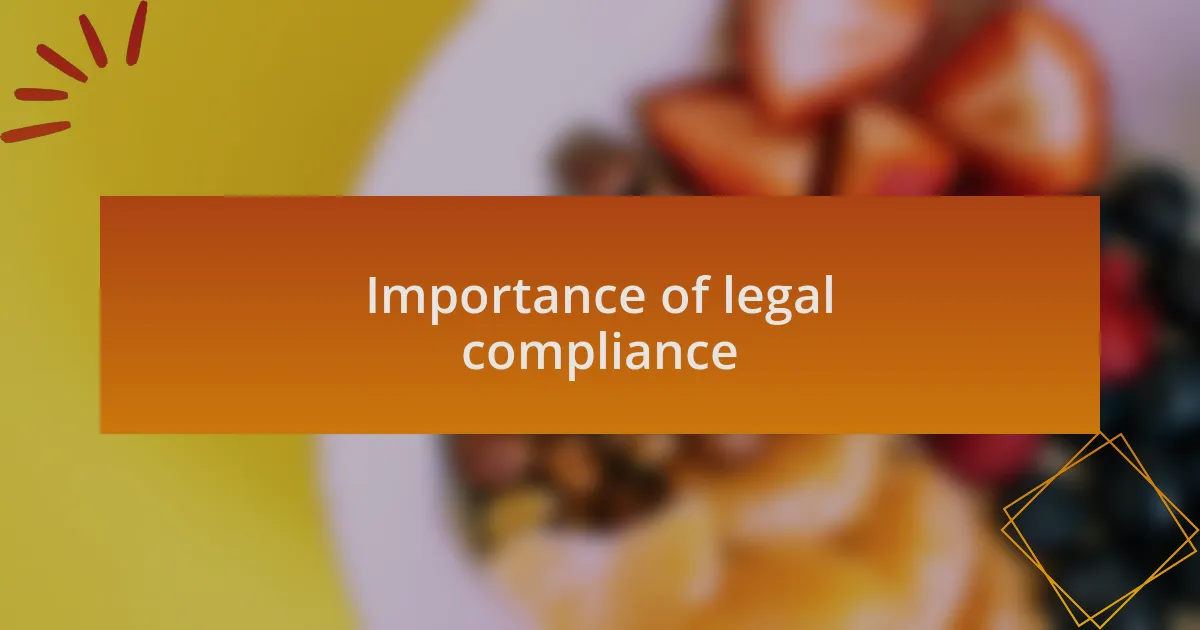
Importance of legal compliance
Ensuring legal compliance is not just about avoiding penalties; it truly reflects a commitment to consumer safety. I remember a time when I received feedback from a customer who was grateful for the comprehensive ingredient list on our packaging. Their appreciation emphasized for me how transparency and adherence to regulations can build loyalty and trust within the community.
Navigating the complexities of cannabis edibles legality can be daunting, especially when it comes to understanding permissible levels of certain cannabinoids. When I first ventured into this field, I found myself overwhelmed by the amount of information. Yet, I quickly realized that staying informed and compliant not only protects my business but also enhances my credibility as a trustworthy source. Aren’t we all searching for assurance in the products we consume?
Moreover, legal compliance can serve as a competitive advantage in the bustling cannabis market. I learned this firsthand during a trade event when my well-labeled, compliant products received more attention than others lacking clarity. It struck me that going above and beyond regulatory requirements positions us not just as sellers but as advocates for responsible consumption. Isn’t it empowering to be part of a movement that prioritizes safety and transparency?
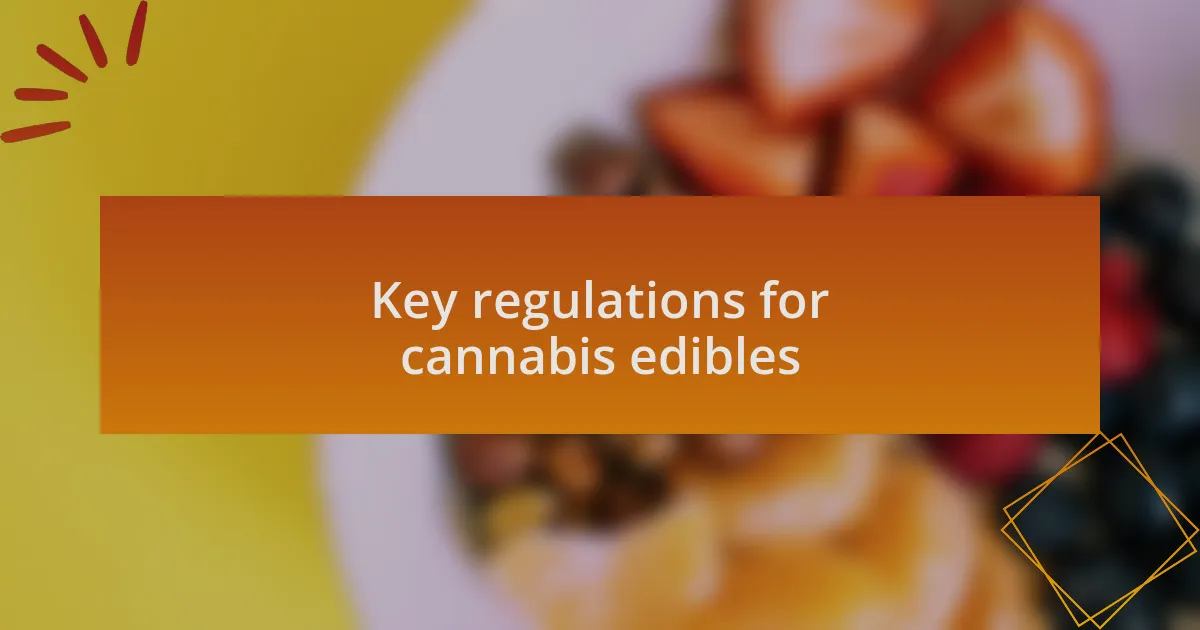
Key regulations for cannabis edibles
When diving into the world of cannabis edibles, it’s crucial to be aware of the key regulations that govern their production and sale. I vividly recall the first time I tried to create my own edibles; I had to sift through a maze of state-specific regulations regarding THC content and packaging requirements. It was a bit overwhelming, but understanding limits on potency, usually capped at 10 mg of THC per serving, became a game-changer for ensuring compliance—and safety—for my customers.
Another critical aspect involves labeling. I found it fascinating how the regulations mandate detailed ingredient lists, warning labels, and dosage information. The moment I revamped my packaging to meet these standards, I noticed a distinct shift in customer perception. It felt rewarding, almost like an unspoken promise to my consumers: “I care about what I sell, and I respect your right to know.” Have you ever considered how a simple label can build such a significant connection with your audience?
Additionally, compliance doesn’t stop at production; it extends into distribution as well. I remember attending a workshop where we discussed transportation regulations, something I initially overlooked. Learning that every product must be transported in a safe and secure manner changed my approach completely. It’s about adherence to not just the letter of the law, but also the spirit of responsible business practices. How does this fit into your philosophy of running your own cannabis venture?
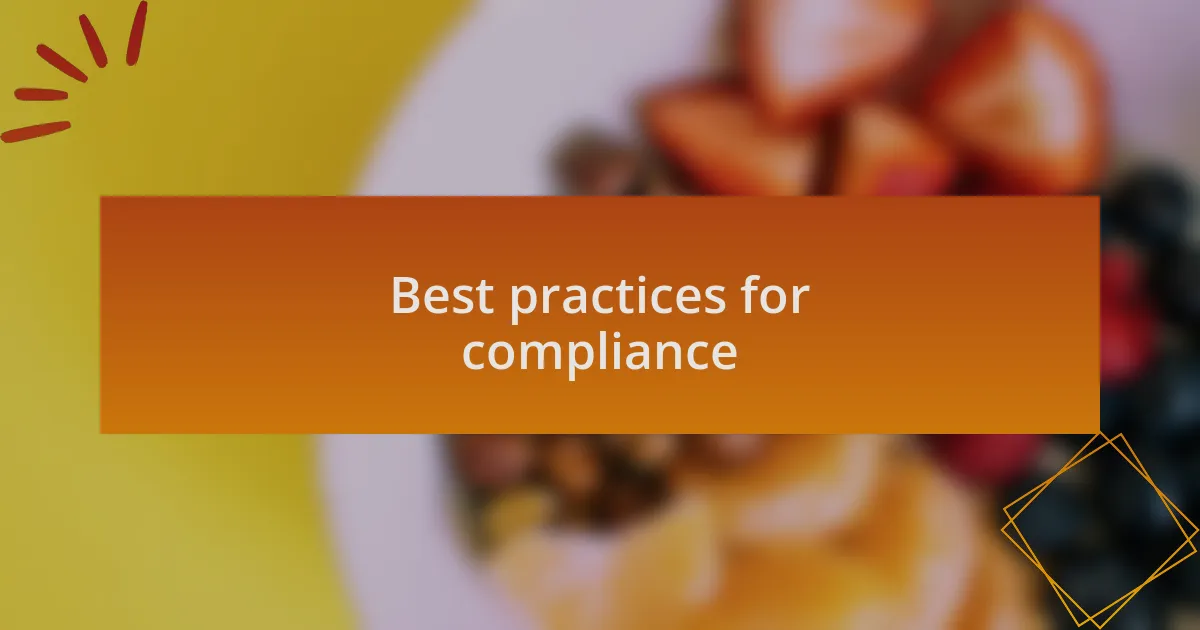
Best practices for compliance
It’s essential to stay updated on compliance best practices, as regulations in the cannabis edibles sector can shift frequently. I once found myself scrambling just days before a compliance audit because I hadn’t double-checked recent changes in testing requirements. This experience taught me that maintaining a proactive approach, such as setting calendar reminders for regulatory updates, can save both time and potential headaches.
In my journey, I’ve always emphasized the importance of employee training. After a steep learning curve with new staff regarding safe handling procedures and customer interactions, I realized how crucial it is to have everyone on the same page. Engaging my team with regular compliance training sessions not only enhanced our operations but also fostered a culture of accountability—making everyone feel like valuable contributors to our mission. Have you ever thought about how empowering your employees through knowledge can create a more compliant and harmonious workplace?
Testing and quality assurance are non-negotiables for compliance in cannabis edibles. Early in my business, I remember shipping out a batch without thorough third-party testing, driven by urgency. The moment I realized my mistake was a sobering wake-up call. Implementing stringent testing protocols not only ensures you’re abiding by the law but also reinforces trust with customers. Isn’t it fulfilling to know that your dedication to safety can significantly impact someone’s experience with cannabis?
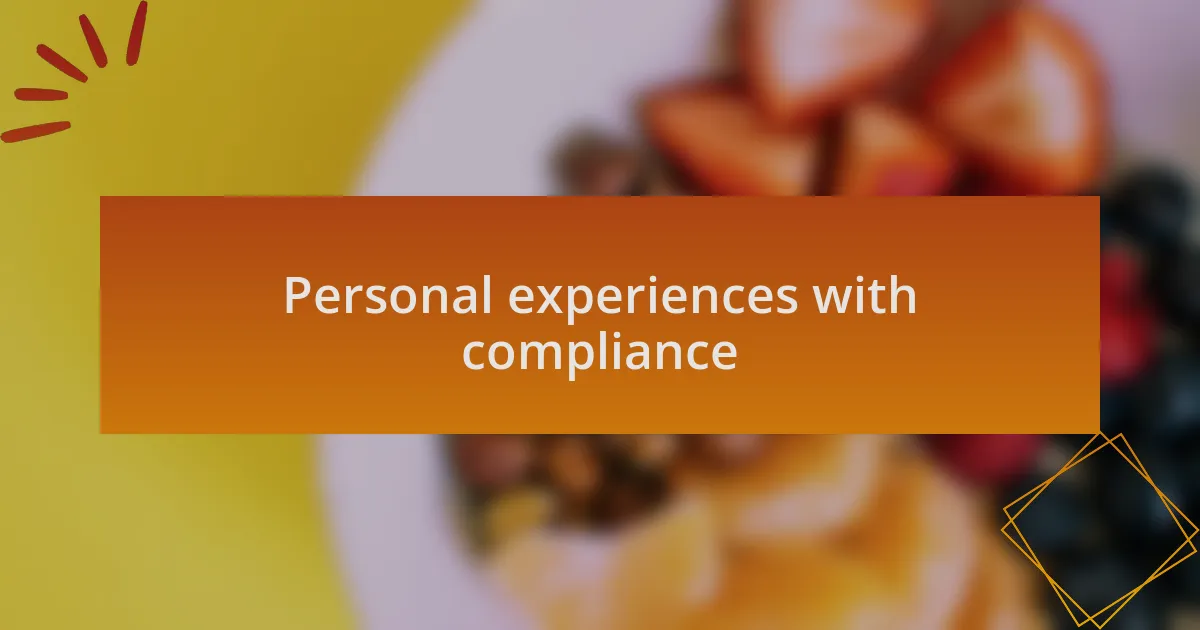
Personal experiences with compliance
Staying compliant can sometimes feel overwhelming, but I’ve learned to embrace the process. There was a particular incident when I faced unexpected regulatory changes that threw my operations into disarray. That moment taught me the value of building strong relationships with local compliance officers; they often have insights that aren’t as easily accessible. Have you ever considered how much easier navigating the maze of regulations can be with a little guidance from the right sources?
One of my early lessons in compliance came during an anonymous review of our packaging labels. I remember the sheer panic I felt when I discovered that I was incorrectly listing ingredients. It was a gut-wrenching experience, but it prompted me to implement a more rigorous review system. Now, I can’t stress enough how pivotal it is to have a compliant eye on every label—after all, we owe it to our customers to ensure they know exactly what they are consuming.
I often reflect on the importance of record-keeping, particularly after I struggled during an audit due to incomplete documentation. The stress of that experience still lingers in my mind. As a result, I’ve made it a priority to maintain comprehensive records for every product batch. It’s become second nature for me, and I can’t help but wonder—how much easier could compliance be for others if they invested the time in meticulous documentation from the start?
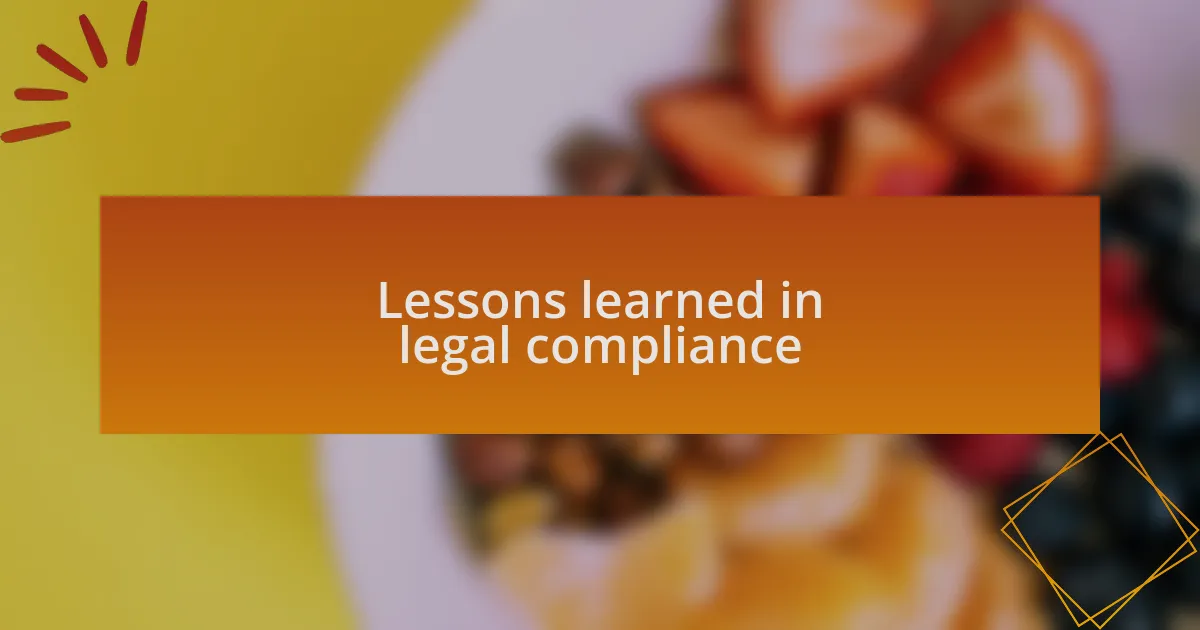
Lessons learned in legal compliance
Navigating legal compliance has taught me one undeniable truth: the importance of continual education. I recall attending a workshop on cannabis regulations and feeling both excitement and dread. The depth of the material was daunting, but it was enlightening to realize that staying informed could keep my business one step ahead of potential pitfalls. Have you ever found that a single piece of knowledge made a world of difference in your compliance practices?
Another lesson emerged from a seemingly small oversight during product testing. I once neglected to double-check lab results, which led to a labeling error that could have had serious legal consequences. This experience was a wake-up call that reinforced my belief in thorough vetting processes. I often ask myself—how many others might overlook such details in the hustle of daily operations?
Lastly, I’ve learned the art of transparency with both my team and my customers. One day, I decided to open up a dialogue about compliance challenges, and the team shared innovative ideas that I had never considered. Their input not only boosted morale but cultivated a culture of accountability. Isn’t it fascinating how openness can transform compliance from a chore into a collective mission?